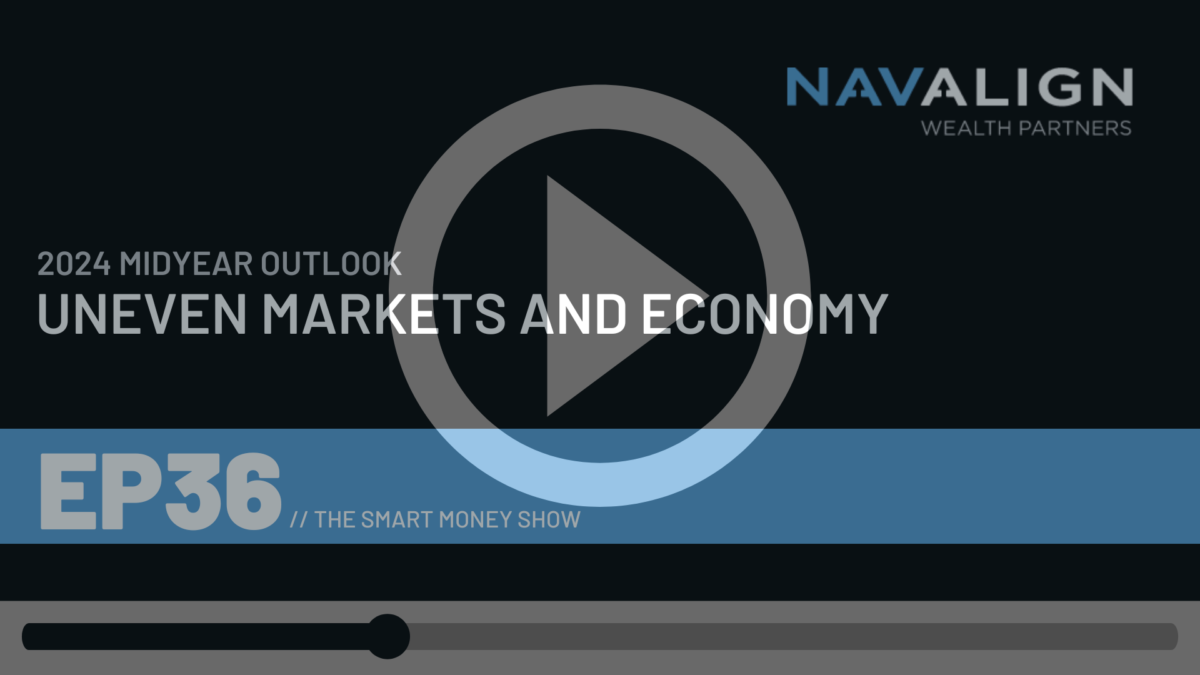Friday, July 26th, 2024

Stephen: Welcome to the Smart Money Show. I’m Stephen Rischall and today we’re going over our 2024 mid-year market recap and economic outlook. Joining me is my partner and co-host David Jacobs. David, how you doing today?
David: I’m doing great, Stephen. Thanks for having me. And if you watch the financial news, the markets are doing pretty great too, but if you look behind the curtain, there’s more, uh, going on that meets the eye, so I’m excited to, uh, get into it.
Stephen: Yep. Well, let’s jump right in and start with an overview of what’s happened so far this year. We’ve seen strong performance in some areas, but it’s been a little uneven. So it, David, can you please elaborate on, on what’s driving this mixed picture?
David: Definitely. So our theme for this outlook is bifurcations in the market and the economy. Uh, so most clients have never been healthier financially, but they have this feeling in their gut that things aren’t good. So if you look at this chart, uh, it kind of shows this K-shaped recovery where some things in the market are doing well, like tech stocks and some inflation is coming down, uh, while others are not doing so well, which is pretty much everything that’s not tech stocks, uh, and, uh, areas like low income earners. So if we actually look at the market for 2024 midway through, it’s up around 15%. It’s hit new high after new high. But again, those tech stocks in particular the Fab Four, formerly the Magnificent Seven, now there’s just four of them. The Fab Four accounted for over 60% of the returns in the market with Nvidia alone counting for over a third of the returns in the market. So typically that’s not super healthy when we see, uh, returns so concentrated. Meanwhile, all stocks that aren’t the Fab Four for the most part have underperformed.
Stephen: Right. And you know, another thing I think that’s important to point out is the disconnect between Wall Street and Main Street. Consumers are feeling the pinch from inflation, but the stock market doesn’t necessarily reflect that. How should investors navigate this environment?
David: Well, it’s crucial to remain diversified. While tech stocks have been driving much of the market gains, it’s important to have a balanced portfolio. Areas like healthcare, utilities, and consumer staples provide some stability and dividends, which can be particularly valuable in volatile markets. Also, keeping an eye on global events is vital. Geopolitical tensions can impact markets significantly, and being prepared for such events can help mitigate risks.
Stephen: Absolutely. And speaking of global events, how are international markets faring in comparison to the U.S.?
David: International markets have had a mixed year as well. European markets have faced challenges with energy prices and political uncertainties, while Asian markets, particularly China, have been dealing with slower economic growth. However, there are still opportunities abroad, especially in emerging markets where valuations are more attractive compared to the U.S.
Stephen: Let’s shift our focus a bit to the fixed income market. How are bonds doing so far this year?
David: Bonds have shown resilience this year and last year. Keep in mind, 2022 was the worst year for bonds ever when rates spiked. We’re actually today on July 26th, the one-year anniversary of the last time the Fed raised rates. So, we’re quite bullish on bonds. Yields are well above their 20-year averages, so it’s a great opportunity for investors.
Stephen: And what should investors consider then when looking at fixed income and bonds moving forward?
David: Hopefully, they’ve already taken our advice on moving long-term money out of cash. Cash is great for a moment, earning five-plus percent, but we do expect one or two rate cuts this year and several next year. So, now is the time to lock in those higher rates by switching long-term money from cash into bonds. Also, remember that as interest rates fall, bond prices go up. If we have a scenario where we do have a hard landing, interest rates across the board are likely to fall, which will mean bonds will do quite well and offset some of the possible losses in the stock market.
Stephen: David, thank you very much as always for your insights. As we move into the second half of 2024, it’s clear that managing inflation expectations, navigating geopolitical risks, and identifying investment opportunities will be key. Remember, it’s about time in the market, not timing the market. Stay informed, stay invested, and if you found this information helpful, please share it with your friends and loved ones. Until next time, I’m Stephen Rischall, that’s David Jacobs, and this is the Smart Money Show.